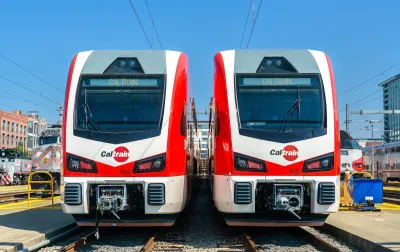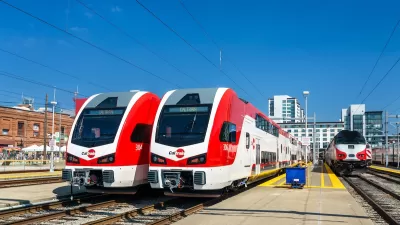U.S. rail agencies are slowly making the shift to zero-emissions trains, which can travel longer distances without refueling and reduce air pollution.

U.S. rail agencies are looking to shift to zero-emissions trains by using battery-powered and hydrogen-fueled trains, and Smart Cities Dive’s Dan Zukowski outlines some of the biggest projects currently underway.
In California, where the state has committed to building a zero-emission passenger rail network by 2050, a hydrogen-powered train is expected to go into service in San Bernardino County in November. The train broke a record during testing for traveling 1,741.7 miles without refueling or recharging. Hydrogen-powered trains emit only water vapor as a byproduct, limiting air pollution in surrounding communities, and are a better solution for longer distances where electric trains might require recharging.
While electrified trains and streetcars are nothing new — in fact, they’re more than a century old — many of the networks that existed in U.S. cities were dismantled or fell into disrepair, and systems using overhead wires or third rails are expensive to maintain. Battery-powered trains can operate on the same rails with less infrastructure, making it possible to extend electrification projects into more areas where the cost of wiring would be prohibitive.
FULL STORY: Where battery and hydrogen-powered trains are coming to US commuter rail

Maui's Vacation Rental Debate Turns Ugly
Verbal attacks, misinformation campaigns and fistfights plague a high-stakes debate to convert thousands of vacation rentals into long-term housing.

Planetizen Federal Action Tracker
A weekly monitor of how Trump’s orders and actions are impacting planners and planning in America.

In Urban Planning, AI Prompting Could be the New Design Thinking
Creativity has long been key to great urban design. What if we see AI as our new creative partner?

California Creates Housing-Focused Agency
Previously, the state’s housing and homelessness programs fell under a grabbag department that also regulates the alcohol industry, car mechanics, and horse racing.

Chicago’s Ghost Rails
Just beneath the surface of the modern city lie the remnants of its expansive early 20th-century streetcar system.

Baker Creek Pavilion: Blending Nature and Architecture in Knoxville
Knoxville’s urban wilderness planning initiative unveils the "Baker Creek Pavilion" to increase the city's access to green spaces.
Urban Design for Planners 1: Software Tools
This six-course series explores essential urban design concepts using open source software and equips planners with the tools they need to participate fully in the urban design process.
Planning for Universal Design
Learn the tools for implementing Universal Design in planning regulations.
planning NEXT
Appalachian Highlands Housing Partners
Mpact (founded as Rail~Volution)
City of Camden Redevelopment Agency
City of Astoria
City of Portland
City of Laramie





























